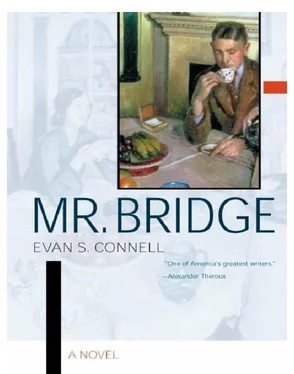However, life had not turned out that way. This seemed strange to him. Strange, also, that during these years they could have lived so near each other, a few blocks apart, yet never met. Probably she must know his name as well as he knew hers. Indeed, she might very easily know him by sight. Someone might have pointed him out to her in the Terrace Grill or at a party. Logically there was no reason they should not become friends.
All at once he realized that his wife was watching. He lowered the paper and looked at her.
“What absorbs you so?” she asked.
“Oh, he replied with a laugh, “just keeping up with society,” and after another glance at Marlene Cornish he turned to the financial section.
Not long after graduating from high school Ruth asked if she might come downtown to have lunch with him. He agreed, and they set a date. Why she wanted to meet him for lunch he did not know. He supposed there was a reason. She must want something.
They arranged to meet in the Aztec Room of the Westport Hotel. He had first suggested Wolferman’s Tea Room because most women liked it — the place was invariably filled with women who had come downtown shopping — but Ruth made a face. Then he mentioned the Drum Room at the President; however, she assented so listlessly that he asked where she would like to eat, and she suggested the Aztec Room. He had been there only once, years ago, for some purpose long since forgotten, but he remembered that he did not like it. The Westport was only four blocks from the Muehlebach, yet in those four blocks another kind of life appeared. In that neighborhood, in that hotel, and in the Aztec Room itself there was something cheap and stale and oppressive, almost sinister. He remembered a trio of Mexicans in sleazy silk blouses and the sequined bandstand and women in their thirties or forties who loitered around the bar as though waiting for messages. On one wall hung a painting of a nude woman done in phosphorescent paint on black velvet and above the piano were several hammered-tin masks with feathered headdresses. The ash trays were black onyx. The matchboxes gave the telephone number of the hotel. Everything about the place was unpleasantly suggestive, and he had never expected to be there again. However, that was where she wanted to have lunch, so that was where they would go.
He arrived a few minutes early. The Aztec Room had not changed. He recognized the stale odor, and there were the women at the bar. He thought of waiting outside and telling her they would eat somewhere else, but the headwaiter was beckoning.
He had just unfolded his napkin and picked up the menu when Ruth entered. She saw him and began sauntering toward the table as if she were in a public park. People watched her, which annoyed him. She did not come directly to the table but walked a little out of her way; it seemed to him that she wanted to be noticed by two men who were at a table in a corner. They appeared to be Italians, although one of them had a Jewish nose. They were young and dressed expensively but in poor taste. Their suits were almost identical. Each had a handkerchief folded into the breast pocket so that the points were visible. The collars of their shirts were prominent. The sleeves were too long. They wore diamond cufflinks. These men were coarse, and perhaps dangerous. One of them, who had obviously had smallpox, was picking his teeth with a matchstick. They were a familiar type in this neighborhood. They had nothing in the bank, but plenty in their wallets. They could be found in certain cocktail lounges at any time of the day. They would pay the check with a large bill and leave a large tip. He studied them until he was sure he could recognize them anywhere under any circumstances, because he was convinced she knew them. However, when she strolled by their table they paid no attention.
The food was not bad, at least there was this to be grateful for; he ate without saying much, waiting for her to indicate the purpose of their luncheon together. Finally, while they were eating spumoni, she said she was not happy in Kansas City. She did not feel at home in the community which always had been her home. The friends she had known all her life were not important to her. She did not want to get married to some boy she had known a long time and become nothing but a housewife. She wanted more out of life than raising children in the suburbs of Kansas City while her husband climbed the ladder. She wanted to move to New York. She wanted to get into theater work. She had a talent for acting. She wanted to attend a theatrical workshop and try out for Broadway plays. If she stayed in Kansas City she could never become an actress. Nobody in Kansas City cared about theater or any of the other arts. There was some Little Theater work but not much; besides, she did not want to act in local productions — not in Kansas City, although that would be all right in New York.
As soon as he found out what she wanted he felt relieved. He had been afraid she was in trouble. He had been reluctant to admit a thought which he could now dismiss quite easily; he had been afraid she was involved with the people who infested this place.
About the acting, he was skeptical. He had seen small evidence of this talent she claimed. She had not gotten the part of Juliet, and although this did not necessarily prove she lacked ability it confirmed his own opinion. She had reduced the balcony scene very nearly to farce. If she could do that to Shakespeare she would probably destroy a lesser playwright. Possibly the talent for acting had missed the family entirely. He himself had never cared much for plays, nor had his wife. Nor had Douglas. Carolyn once played the part of the Virgin Mary in a children’s Christmas play, but her characterization was unremarkable: for about fifteen minutes she sat absolutely motionless on a three-legged stool and pensively considered a lightbulb in a cradle. Never was there a more rigid Virgin. Ruth’s Juliet leaned heavily on the other side of the scale, with much flinging of hair, sighing, murmuring, pleading, wetting of lips, and so forth. And regardless of her ability, acting was reputed to be among the most difficult ways to earn a living.
However, he reflected, he knew next to nothing about such matters, and it was at least possible that she could succeed. Maybe she deserved a chance. There was little to be gained by discouraging or forbidding her. The hour for this might come when she herself had learned how difficult it was. Then she might welcome his disapproval so she could give up and try something else without feeling humiliated.
He asked what her mother thought of the idea. Ruth answered that she had not mentioned it at home, and he was surprised because the children never came to him first. For money or for permission to use the car they were accustomed to asking him, but that was all. For everything else they went to their mother. He felt oddly moved, and took off his glasses and slowly polished them while Ruth continued talking, attempting to convince him she would be safe in New York. An older sister of Nathalie Blakely lived in New York and was married to the vice-president of an advertising agency. Nathalie was writing to her sister. And so on, and so on.
Mr. Bridge listened to his daughter’s voice, but what she said was irrelevant. She would not be around much longer. What Alexis Sauer had predicted was about to come true. Ruth was going away. He could prevent this, if he chose, but only for a little while. Finally he told her he would think it over, and they must find out how her mother felt; but he knew she would be leaving, and he knew he must allow it.
Soon she was gone. Each evening when he returned from the office he hoped to find her at home, or to hear that she had called from New York saying she was coming home; and each evening he inquired if there had been a letter. She wrote seldom, and briefly, addressing the letters to Mr. and Mrs. Walter G. Bridge, and although these letters were meant for them both he knew that she wrote with her mother in mind.
Читать дальше












